| Srl | Item |
| 1 |
ID:
086650
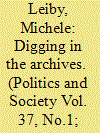

|
|
|
|
|
| Publication |
2009.
|
| Summary/Abstract |
This article explores the methodological obstacles to research on wartime sexual violence and the extent to which they can be overcome with archival research. It discusses issues of concept formation, counting victims of human rights abuse, and coding violations. It compares figures from the Peruvian Truth and Reconciliation Commission's final report, an analysis of the Commission's published materials, and an analysis of the primary documents and finds that (1) the number of reported cases of sexual violence is significantly higher than the 538 cited by the Commission, (2) men were more often the targets of sexual violence than previously thought, and (3) sexual humiliation and sexual torture were common practices during the war
|
|
|
|
|
|
|
|
|
|
|
|
|
|
|
|
| 2 |
ID:
128858
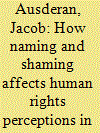

|
|
|
|
|
| Publication |
2014.
|
| Summary/Abstract |
Although individual citizens perceive the human rights conditions in their country differently, existing research on human rights and public opinion has tended to ignore the possible impact from international sources of information. This article builds upon previous research on human rights, public opinion, and international organizations by arguing that citizens will perceive the human rights conditions in their country more negatively when their country is shamed by the international community for human rights violations. This hypothesis is tested using both observational and experimental methods. I use multilevel modeling and survey responses from both the Gallup International Millennium Survey and the World Values Survey to show that individual human rights perceptions are negatively related to the adoption of resolutions by the United Nations Commission on Human Rights shaming a survey respondent's government for human rights abuses, as well as the number of human rights-focused international nongovernmental organizations with members or volunteers living within the survey respondent's country. These results are supplemented by an original, web-based experiment on human rights perceptions in the United States and India in which survey respondents are exposed to an experimental manipulation modeled on press statements from Amnesty International shaming the survey respondent's country for human rights abuses.
|
|
|
|
|
|
|
|
|
|
|
|
|
|
|
|
| 3 |
ID:
185522
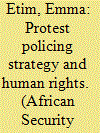

|
|
|
|
|
| Summary/Abstract |
In this study, we adopted the negotiation management model (NMM) and the elaborated social identity model (ESIM) to assess and match with global best practices the conduct of personnel of the Nigerian Police Force during the End SARS protest. We used the descriptive mixed-method research design to answer the research questions after taking stock of some achievements recorded by SARS and critical factors that led to the protest. We discovered, among others, that the Nigerian Police Force lacks a functional public complaint mechanism through which members of the society can express their grievances concerning the activities of personnel of the force. Further, the orthodox belief that a dominant show of force would compel protesters to comply with government directives failed during the End SARS protest. Our finding validates H. F. Guggenheim Foundation Guide that the police's response to peaceful gatherings as if they were riots and their failure to prevent a violent development at an early stage would lead to the degeneration of protests. The study makes recommendations on achieving a peaceful and well-managed protest if a demonstration becomes inevitable.
|
|
|
|
|
|
|
|
|
|
|
|
|
|
|
|
| 4 |
ID:
095682
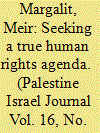

|
|
|
| 5 |
ID:
114676
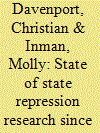

|
|
|
|
|
| Publication |
2012.
|
| Summary/Abstract |
Researchers have been exploring government repressive behavior for decades, but the greatest improvements have come in the last two. For example, greater theoretical specification has allowed us to determine a great deal about what repression is and why it occurs, while greater methodological sophistication has allowed us to test these theories rigorously. Despite or rather because of these advancements, however, we know comparatively little about what impact repression has on other social, economic, and political phenomena. This article reviews our general knowledge of the topic and attempts to improve our understanding of how repressive action influences behavioral challenges to governments.
|
|
|
|
|
|
|
|
|
|
|
|
|
|
|
|